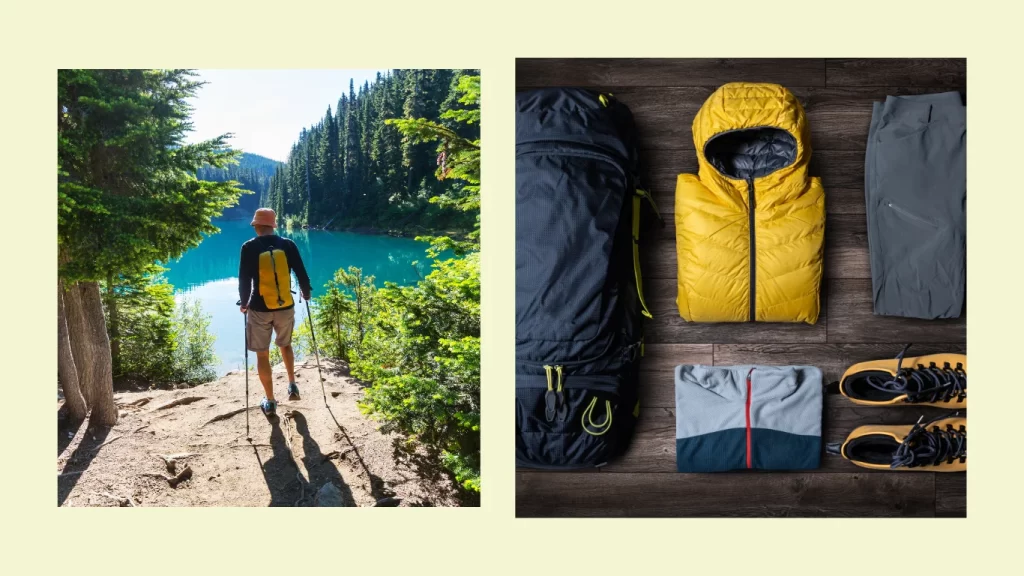Embarking on a long-distance hike is not just about stepping into the wilderness; it’s a profound journey that demands physical endurance, mental resilience, and meticulous preparation. Understanding the significance of training for long-distance hikes is key for anyone looking to embark on long hiking trails.
This article is a personalized training plan specifically for long hike readiness, emphasizing the importance of hiking conditioning exercises and preparing for a thru-hike both physically and mentally. It outlines essential gear and nutrition for hikers. It is important in sustaining energy and motivation across complicated hikes and unpredictable weather conditions. Additionally, we go through the crucial aspect of mental preparation for hiking, offering hike training tips that empower hikers to overcome external and internal obstacles. Through a comprehensive discussion on extended hike readiness, this article equips readers with the tools and knowledge for a successful and fulfilling hiking adventure, positioning them to start and thrive on the trail.
Hike Training Tips for Long-Distance Hikes
Physical and Mental Benefits
Proper training for a long distance hike enhances physical fitness and prepares the mind for future challenges. Running, for instance, can significantly boost aerobic fitness. However, it’s essential to incorporate hiking-specific conditioning to prepare for unpredictable and uneven tracks. Strength and resistance training improves muscle endurance and help carry the necessary gear, preventing injuries and enhancing overall trail performance.
Common Challenges

Many hikers face physical exhaustion, general soreness, and even injuries such as plantar fasciitis or a hiker’s knee, which can spoil their hiking plans. Preparing for such injuries is through targeted physical training, which mitigates such risks in the long run. Additionally, exercise helps manage and prevent significant injuries and reduces the likelihood of fatigue-induced accidents.
Preparing for a Thru-Hike
Thorough preparation is required for a successful long-distance hike. It involves more than just physical training; mental readiness plays a crucial role. Engaging in various physical activities like hiking, backpacking, and strength training builds a fitness base, making the hike more enjoyable and less strenuous. Being physically prepared allows hikers to enjoy the scenery and experience rather than struggling with physical limitations.
Developing a Personalized Training Plan
Assessing Your Current Fitness Level

To assess your fitness level, start by honestly evaluating your current physical condition. Consider any discomfort or injuries, especially in areas critical for hiking, such as knees, feet, or back. Consulting with a healthcare provider if you have concerns about your fitness or health that might affect your ability to train safely can also be helpful.
Setting Realistic Goals
Set specific, attainable, relevant, and time-bound goals to guide your training. For instance, aim to hike a certain distance by a particular date or increase the duration of your hikes gradually over a few months. Ensure these goals align with your hike fitness training level.
Cardio, Strength, and Flexibility – Endurance Training for Hiking
Develop a balanced hiking workout routine, including cardiovascular exercises like walking or stair climbing, strength training such as squats and lunges, and dynamic stretching flexibility routines. This combination prepares you for the varied physical demands of hiking. Incorporate exercises that mimic the hiking experience, like using a weighted pack during walks.
Scheduling Rest Days and Recovery
Recognize the importance of rest days to prevent overtraining and injuries. Plan regular rest days into your schedule to allow your body to recover and strengthen. Practice low-intensity activities like yoga or gentle walking to maintain mobility without overexerting yourself.
Essential Gear and Nutrition for Long-Distance Hikers
Choosing the best footwear and clothing is crucial for a successful long-distance hike. Footwear should be selected based on comfort, weight, and the specific environmental conditions expected on the trail. For instance, synthetic/leather boots are great for their durability and water resistance and are ideal for snowy or rugged terrains. Clothing choices like Merino wool layers and waterproof jackets are good for maintaining comfort and protection against the elements.
Nutrition for Hikers

Nutrition and hydration are essential for long hikes. Starting hydrated is the key to maintaining hydration throughout the hike. Six to twelve ounces every 15 to 20 minutes is recommended. Carbohydrates are crucial as they provide the primary energy source. The recommended amount is 30 to 60 grams per hour during the hike. Electrolyte replenishment is critical to prevent imbalances affecting performance, especially in hot conditions.
Navigating Mental Toughness and Overcoming Challenges
Mental Preparation for Hiking
Mental toughness is a crucial aspect of long-distance hiking, often described as the ability to persist in facing difficulties. Cultivating this trait involves seeing challenges as opportunities and maintaining a positive internal dialogue. Regular mental training, such as visualization and neuroplasticity, can significantly enhance mental resilience. Additionally, setting small, achievable goals during the hike helps maintain focus and motivation.
Strategies for Dealing with Physical Discomfort and Fatigue
Physical discomfort and fatigue are common during long hikes; managing them is essential for mental toughness. Starting the hike gradually allows the body to warm up, reducing the risk of fatigue and muscle soreness. Hydration and nutrition are also critical; focus on water intake before the hike and maintain it throughout. Stretching before and after hikes can help alleviate muscle soreness and prevent fatigue.
Long-distance Hike Preparation Tips

- Minimize the load to enhance hiking enjoyment and performance. Carrying only essential items reduces the physical burden, making the hike more enjoyable and less taxing on the body.
- Engage in shakedown hikes to evaluate and possibly reduce the gear being carried. This practice helps identify unnecessary items and adjust the pack weight accordingly.
- Focus on suitable footwear to prevent discomfort and injuries. Lighter boots or trail runners are often sufficient to prevent issues like swollen feet after long hikes.
- Mental preparation is equally important; many hikers don’t finish due to mental challenges rather than physical limitations. Developing mental resilience can help manage the psychological demands of long-distance hiking.
- Regularly adjust the pack’s harness and straps to distribute weight evenly and prevent muscle strain. Making minor adjustments to the walking gait can also help reduce muscle tension and fatigue.
- Maintain a steady pace throughout the hike to save energy and reduce injuries.
- Keep a positive mindset and use motivational mantras to overcome physical and mental challenges encountered on the trail.
Conclusion – Training for Long-Distance Hike
Embarking on a long-distance hike is a journey that stretches beyond the physical realms, calling for a profound blend of strength, stamina, and spirit. This article provided a detailed framework for developing a personalized training regimen, emphasizing the importance of gear, nutrition, and the indispensable role of mental toughness in overcoming the challenges that lie on the path. We hope your journey is as rewarding as the destination, full of personal achievements and a profound respect for the natural world. Ultimately, the journey of a long-distance hike is a testament to the human spirit’s capacity to endure, adapt, and thrive amidst the grandeur of nature.
Embarking on your next hiking journey? Make sure to read our hiking safety tips article to ensure a safe adventure.
How can I get my body ready for a long-distance hike?
To prepare your body for long-distance hiking, take practice hikes while carrying a full backpack. Incorporate challenging uphill walks to strengthen your legs. Go to the gym or do home exercises to build the strength of your back and core muscles, which are crucial for managing your pack’s weight and maintaining balance on the trail. Additionally, finding a comfortable combination of hiking boots and socks is essential to prepare your feet for extended periods of activity.
What steps should I take to prepare for an extensive hike?
Begin by focusing on building your physical strength through resistance training sessions several times each week. Pay special attention to strengthening your legs, glutes, and core muscles, vital for hiking endurance. Exercises like calf raises, squats, and lunges are particularly beneficial for getting your muscles ready for the demands of a mountain hike.
What training regimen is recommended for an exceptionally long hike?
In preparation for a very long hike, modify your training about two weeks before your trip by replacing your regular cardio exercises with long day hikes. These hikes should last 60 minutes or more and involve carrying a backpack approximately the same weight you’ll have during your actual hike. Add a fourth day of hiking to one of your strength-training days. To ensure you’re well-rested for your trip, reduce your training intensity one or two days before departure.
How should I train for a 20km hike?
To train for a 20km hike, starting by walking 10km three to four times a week for several months is recommended. As the hike approaches, increase your training to include two 20km weekly walks. It’s important to note that if you’re hiking without carrying a weighted pack, you can adjust your training accordingly and focus more on building endurance and strength for the distance.





